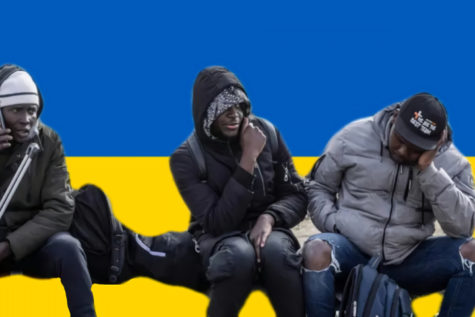OPINION | Ukraine highlights hypocrisy in humanitarian efforts
March 23, 2022

Right now in Europe, millions of Ukrainians seek safety as the largest refugee crisis since World War II takes place. Two and a half million people flee as a demoralized Russia escalates its aggressive tactics in Ukraine, with rumors of war crimes against civilians and threats of nuclear attacks. Many have lost everything as Russia attempts to adhere to an outdated empire-building strategy in a globalized modern world.
As a result, billions of dollars have poured into Ukraine to avert a global crisis, with the United States Congress recently approving $13.6 billion of aid. But as most of us know, the Russian violation of a sovereign nation is not the only calamity happening in the world right now. Millions of Palestinians are living under what the Humans’ Right Watch calls “crimes against humanity of apartheid.” In China, the government is persecuting millions of Uyghur Muslims in a blatant act of ethnic cleansing. And in Yemen, a brutal civil war started in 2015 is still ravaging the nation, with known incidents of the Saudi-backed coalition using weapons obtained in U.S. and British arms sales to target civilian refugee camps. While we seemingly live in a world united against war and violence, the truth could not be farther from this.
It seems everywhere one looks, Ukraine surrounds them. An elusive “Ghost of Kyiv” who shoots down Russian air power with ease, an unwavering president who has survived three assassination attempts and a global outpouring of sympathy against war. It seems anytime a crisis occurs in Europe, the whole world feels the need to intervene. But when these wars and outbreaks of violence occur elsewhere, the world just stops and stares. Observing this phenomenon brings to mind the question of why. Why did Ukraine receive such a sudden and strong system of global support when long-term ethnic violence in other countries has worsened? A double standard exists when it comes to how much aid and sympathy countries are willing to give when war knocks on their doors. In 2015, memories of how Syrian refugees were refused entry and abused by European border officers sharply contrast with the willingness of European nations’ current willingness to accept Ukrainians. In situations where the victims bear a resemblance to their protectors, acts of assistance are disproportionately stronger.
Even in the aforementioned crises, when compared to what Ukraine has received in a much shorter period of time, it almost seems that the world is not afraid to broadcast its own hypocrisy. Support for non-white victims is little and fleeting. Remember when people changed their profile pictures on social media to blue for Sudan? And although most people moved on with their lives, the country still faces humanitarian complications.
The goal of this is not to denounce the world for helping Ukraine. A genuine threat to democracy and flagrant violation of human rights by a desperate dictator should be met by a unionized global resistance. But we should also keep that same energy for groups that do not look like us. After World War II, the world made a promise to never let something as horrible as the Holocaust ever happen again. The world made a promise to never lay idle while injustice occurs, to intervene when necessary and to provide aid regardless of race or religion. We created organizations such as the United Nations and North Atlantic Treaty Organization. We promoted a belief in the protection of human rights and promised to maintain a global order. And in some aspects, we kept that promise. But we should not be selective with our help. We should not be swayed by political or racial bias. By being apathetic, we fail to learn from our mistakes and subjugate groups of innocent people to incredible suffering all while maintaining the hypocrisy of global peace.






















Richard Levy • Mar 24, 2022 at 10:38 am
There are many causes in the world and many injustices.Palestinians have made their own problems.They have all the rights any Israeli has but concentrate on terrorism and rocket making. China Urgurs are different. They are the victims of Chinese Genocide and the world is petrified of China’s financial strength- that is terrible, to allow slaughter with no consequences- ask Nike and others with slave labor who stay silent.Ukraine is genocide also. Many remember Stalin killing over 20 million Ukrainians in the 1940s. We can stop genocide if we open our mouths and place financial and military pressure on those who commit it.
Josephine • Mar 24, 2022 at 3:20 am
The West weren’t selective in their help, as well as NATO the6 founded CENTO and SEATO, both of which foundered because of internal disagreements and revolutions amongst their members.
India, of cours, never joined either as it believed newly independent nations needed to find their own paths without such links – the Third World of the Cold War.
It is only natural that Europe pays may attention to Ukraine on its border – in the same way that India pays more heed to Pakistan – and China.